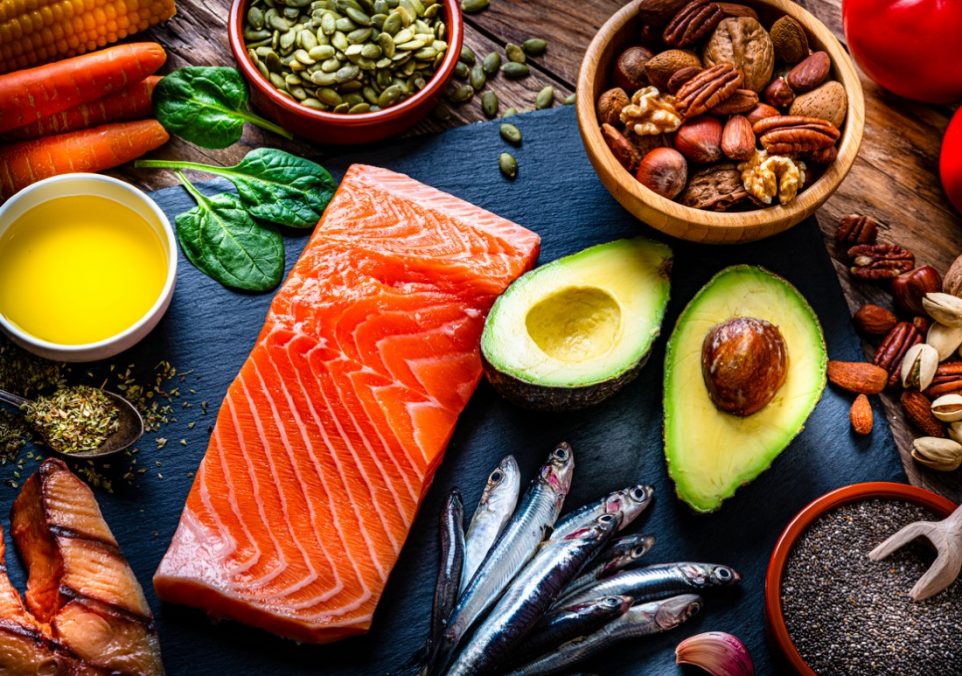Here’s How Much Omega-3 Fatty Acid You Should Have a Day

Omega-3 fatty acids are essential nutrients that help support brain functioning, heart and skin health and overall wellness. Many of us don’t get enough omega-3 fatty acids from our daily diets, leaving us at risk for diseases and nutrient deficiencies. Luckily, there are plenty of ways to get more of it into your diet.
In this post, we’ll provide a comprehensive look at omega-3, including the different types, what they do for our bodies and the different sources of this fatty acid. Whether you’re vegan, vegetarian or an omnivore, we can help you make sure you get the daily servings of omega-3 that you need to keep your health on track.
Types and Sources of Omega-3 Fatty Acids
When discussing omega-3 fatty acids, there are three primary types: ALA (alpha-linolenic acid), DHA (docosahexaenoic acid) and EPA (eicosapentaenoic acid).
The primary sources of ALA come from plants. This includes walnuts, flaxseed, hemp seeds, chia seeds and soybeans. Meanwhile, DHA and EPA primarily come from fish such as salmon, herring, mackerel, sardines and cod liver oil.
Health Benefits of Omega-3 Fatty Acids
Omega-3 fatty acids have numerous health benefits. When it comes to cardiovascular health, consuming enough omega-3 fatty acids may help reduce cholesterol levels, lower blood pressure, improve arterial health and reduce inflammation associated with heart disease.
Consuming enough omega-3 fatty acids has also been linked with improved brain health. It may help improve memory and cognitive performance while reducing inflammation in the brain. Studies also suggest that increasing your intake of omega-3 fatty acids may help to reduce symptoms associated with depression and anxiety disorders.
Another benefit of omega-3 fatty acids is related to skin health. It may help in reducing signs of aging and help with dryness or flakiness associated with certain skin conditions such as eczema.
What Experts Say
In terms of recommended daily amounts of omega-3 fatty acids, the US National Academy of Medicine suggests that adults 19 years old and over should consume at least 1.6g of ALA per day for men and 1.1g for women each day. As for DHA and EPA specifically, it’s recommended that adults consume 250mg per day for men and 200mg for women.
How To Get Omega-3 Fatty Acids in Your Diet
A good way to ensure you’re getting an adequate intake of omega-3 fatty acids is through diet rather than supplements when possible. When it comes to fish sources such as salmon or tuna, try baking, poaching or steaming instead of deep frying since this form of cooking maintains more of the omega-3 content.
In terms of nuts and seeds high in ALA content, such as walnuts or flaxseeds, try incorporating them into salads or adding them into oatmeal as part of breakfast dishes. They’re also delicious when added to smoothies or smoothies bowls. Plus, there are other plant-based sources rich in ALA, including brussels sprouts, spinach, kale, collard greens, cauliflower, cabbage, broccoli rabe and arugula, in case you’re not a fan of nuts and seeds.
Don’t forget about the importance of healthy fats such as extra virgin olive oil or avocado oil when preparing meals since these can serve as an alternative source of omega-3 fatty acids (albeit not as much as animal sources).
Of course, in some cases, it can be difficult to get enough omega-3 fatty acids through diet alone. Some people also struggle with getting enough due to certain medical issues. In this case, taking omega-3 supplements can be beneficial. Just be sure to discuss it with your doctor before adding it to your regimen.
Building a Stronger You
Supplement Institute is the fruit of extensive online publishing experience, spanning the breadth of SEO strategies to the nuances of paid advertisements. Our journey, marked by significant achievements and learning moments, inspires our core mission: to empower our readers with an abundance of information. By sharing insights and key learnings, we aim to provide you with the knowledge needed to navigate the complex world of supplements, helping you make well-informed decisions for your health and well-being. Welcome to Supplement Institute, where information is your greatest supplement.